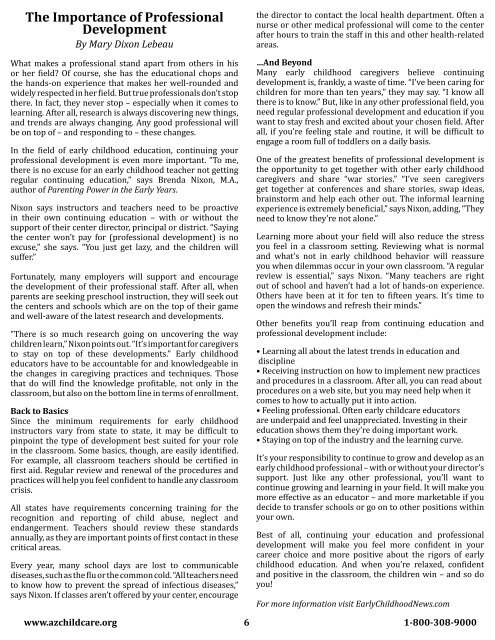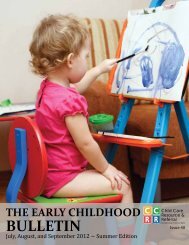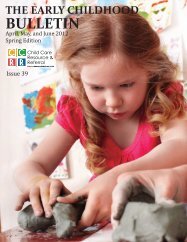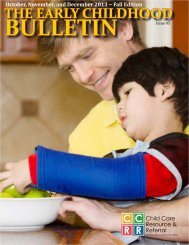pIma COUNTY - Child & Family Resources
pIma COUNTY - Child & Family Resources
pIma COUNTY - Child & Family Resources
Create successful ePaper yourself
Turn your PDF publications into a flip-book with our unique Google optimized e-Paper software.
The Importance of Professional<br />
Development<br />
By Mary Dixon Lebeau<br />
What makes a professional stand apart from others in his<br />
or her field? Of course, she has the educational chops and<br />
the hands-on experience that makes her well-rounded and<br />
widely respected in her field. But true professionals don’t stop<br />
there. In fact, they never stop – especially when it comes to<br />
learning. After all, research is always discovering new things,<br />
and trends are always changing. Any good professional will<br />
be on top of – and responding to – these changes.<br />
In the field of early childhood education, continuing your<br />
professional development is even more important. “To me,<br />
there is no excuse for an early childhood teacher not getting<br />
regular continuing education,” says Brenda Nixon, M.A.,<br />
author of Parenting Power in the Early Years.<br />
Nixon says instructors and teachers need to be proactive<br />
in their own continuing education – with or without the<br />
support of their center director, principal or district. “Saying<br />
the center won’t pay for (professional development) is no<br />
excuse,” she says. “You just get lazy, and the children will<br />
suffer.”<br />
Fortunately, many employers will support and encourage<br />
the development of their professional staff. After all, when<br />
parents are seeking preschool instruction, they will seek out<br />
the centers and schools which are on the top of their game<br />
and well-aware of the latest research and developments.<br />
“There is so much research going on uncovering the way<br />
children learn,” Nixon points out. “It’s important for caregivers<br />
to stay on top of these developments.” Early childhood<br />
educators have to be accountable for and knowledgeable in<br />
the changes in caregiving practices and techniques. Those<br />
that do will find the knowledge profitable, not only in the<br />
classroom, but also on the bottom line in terms of enrollment.<br />
Back to Basics<br />
Since the minimum requirements for early childhood<br />
instructors vary from state to state, it may be difficult to<br />
pinpoint the type of development best suited for your role<br />
in the classroom. Some basics, though, are easily identified.<br />
For example, all classroom teachers should be certified in<br />
first aid. Regular review and renewal of the procedures and<br />
practices will help you feel confident to handle any classroom<br />
crisis.<br />
All states have requirements concerning training for the<br />
recognition and reporting of child abuse, neglect and<br />
endangerment. Teachers should review these standards<br />
annually, as they are important points of first contact in these<br />
critical areas.<br />
Every year, many school days are lost to communicable<br />
diseases, such as the flu or the common cold. “All teachers need<br />
to know how to prevent the spread of infectious diseases,”<br />
says Nixon. If classes aren’t offered by your center, encourage<br />
the director to contact the local health department. Often a<br />
nurse or other medical professional will come to the center<br />
after hours to train the staff in this and other health-related<br />
areas.<br />
…And Beyond<br />
Many early childhood caregivers believe continuing<br />
development is, frankly, a waste of time. “I’ve been caring for<br />
children for more than ten years,” they may say. “I know all<br />
there is to know.” But, like in any other professional field, you<br />
need regular professional development and education if you<br />
want to stay fresh and excited about your chosen field. After<br />
all, if you’re feeling stale and routine, it will be difficult to<br />
engage a room full of toddlers on a daily basis.<br />
One of the greatest benefits of professional development is<br />
the opportunity to get together with other early childhood<br />
caregivers and share “war stories.” “I’ve seen caregivers<br />
get together at conferences and share stories, swap ideas,<br />
brainstorm and help each other out. The informal learning<br />
experience is extremely beneficial,” says Nixon, adding, “They<br />
need to know they’re not alone.”<br />
Learning more about your field will also reduce the stress<br />
you feel in a classroom setting. Reviewing what is normal<br />
and what’s not in early childhood behavior will reassure<br />
you when dilemmas occur in your own classroom. “A regular<br />
review is essential,” says Nixon. “Many teachers are right<br />
out of school and haven’t had a lot of hands-on experience.<br />
Others have been at it for ten to fifteen years. It’s time to<br />
open the windows and refresh their minds.”<br />
Other benefits you’ll reap from continuing education and<br />
professional development include:<br />
• Learning all about the latest trends in education and<br />
discipline<br />
• Receiving instruction on how to implement new practices<br />
and procedures in a classroom. After all, you can read about<br />
procedures on a web site, but you may need help when it<br />
comes to how to actually put it into action.<br />
• Feeling professional. Often early childcare educators<br />
are underpaid and feel unappreciated. Investing in their<br />
education shows them they’re doing important work.<br />
• Staying on top of the industry and the learning curve.<br />
It’s your responsibility to continue to grow and develop as an<br />
early childhood professional – with or without your director’s<br />
support. Just like any other professional, you’ll want to<br />
continue growing and learning in your field. It will make you<br />
more effective as an educator – and more marketable if you<br />
decide to transfer schools or go on to other positions within<br />
your own.<br />
Best of all, continuing your education and professional<br />
development will make you feel more confident in your<br />
career choice and more positive about the rigors of early<br />
childhood education. And when you’re relaxed, confident<br />
and positive in the classroom, the children win – and so do<br />
you!<br />
For more information visit Early<strong>Child</strong>hoodNews.com<br />
www.azchildcare.org 6 1-800-308-9000





